Updates
Recent Updates for Mobile Food Facility Permits
On February 6, 2024, the Los Angeles County Board of Supervisors approved changes to health permits, fees, and services for mobile food businesses that took effect on March 6, 2024. View the Changes Announcement and the New Mobile Food Facilities Fee Schedule for more information.
Updated: 2024-05-14
About Mobile Food Facilities
Street food offers a convenient way for people to buy food on the go. Food trucks also called mobile food facilities, can sell a variety of foods, from prepackaged chips and soda cans to full meals prepared in the truck.
There are many rules and regulations that determine how people can prepare and sell food. Those rules are designed to protect the health and safety of the public. For mobile food facilities that are allowed in Los Angeles County, such as trucks operators must have permits, pass inspection, and follow the rules about handling food. Every approved food truck in Los Angeles County should have a Letter Grade and a certification sticker indicating that it is a permitted food facility. You can look for these stickers on the outside of the food truck.
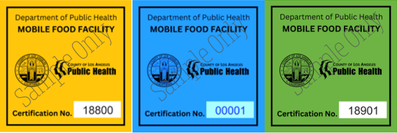
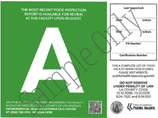
Public Health permits and inspects all mobile food facilities in Los Angeles County.
Public Health is responsible for enforcing the California Health and Safety Code in all of Los Angeles County except for those located in the cities of Long Beach, Pasadena, and Vernon. Those cities have their own environmental health departments that enforce the Code within their jurisdiction.
No smoking is allowed within 40 feet of mobile food trucks or carts. All mobile food facilities must display signs that state the no smoking rule. Details about the requirements and examples for downloading are available on the No Smoking Signage Page.
The Marking Guide details what inspectors look for during an inspection and how conditions will be marked during an inspection.
Mobile Food Facility Inspection Guide
Mobile Food Facility Route Sheet
All mobile food facilities are required to notify Public Health of their route and schedule and must provide an update anytime significant changes occur to the route (Los Angeles County Code, Title 8, section 8.04.403). You can use this link to submit a Mobile Food Facility Route Sheet using our online form to update the days, times, and locations you will operate your Mobile Food Facility during the week.
The following online platforms are approved alternative methods for Mobile Food Operators to submit their routes, however are not endorsed by Public Health:
- Post on social media (Facebook, Instagram, Twitter, Yelp, or others)*
- Submit an update at https://trucks.bestfoodtrucks.com/signup/reporting*
*Note: These companies are not endorsed by the Department of Public Health.
Flyer: Mobile Food Facilities must report their route and schedule to Public Health
Flyer: Mobile Food Facilities must report their route and schedule to Public Health
Resources
- Commissary - a food facility in which food, equipment, and/or supplies are stored or handled, food is prepared or prepackaged for sale or service at other locations, utensils are cleaned, liquid or solid wastes are disposed of, and potable water is obtained for used in MFFs
- Food Service Boats - refers to any boats such as ferry boats, sightseeing cruises, whale watching tours, and charter fishing boats operating within three miles from the shore that offer food for sale or prepare food for passengers.
- High-risk mobile food truck - a fully enclosed mobile food facility in which complex menu items are prepared and extensive food preparation occurs
-
High-risk mobile food cart
- An unenclosed mobile food facility in which:
-
food preparation that is restricted to one or more of the following:
- Heating, frying, baking, roasting, popping, shaving of ice, blending, steaming or boiling of hot dogs, or assembly of non-prepackaged food
- Dispensing and portioning of non-potentially hazardous food
- Holding, portioning, and dispensing of any foods that are prepared for satellite food service by the onsite permanent food facility or prepackaged by another approved source
- Slicing and chopping of food on a heated cooking surface during the cooking process
- Cooking and seasoning to order
- Preparing beverages that are for immediate service, in response to an individual consumer order, that do not contain frozen milk products
-
"Limited food preparation" does not include any of the following:
- Slicing and chopping unless it is on the heated cooking surface
- Thawing
- Cooling of cooked, potentially hazardous food
- Grinding raw ingredients or potentially hazardous food
- Reheating of potentially hazardous foods for hot holding, except for steamed or boiled hot dogs and tamales in the original, inedible wrapper
- Hot holding of non-prepackaged, potentially hazardous food, except for roasting corn on the cob roasting corn on the cob, steamed or boiled hot dogs, and tamales in the original, inedible wrapper
- Washing of foods
- Cooking of potentially hazardous foods for later use
-
food preparation that is restricted to one or more of the following:
- Mobile Food Facility (MFF) - any vehicle used in conjunction with a commissary or other permanent food facility upon which food is sold or distributed at retail
-
Mobile Food Facility Route Sheet - Available in English , provides information to the Mobile Food Program as to the location and times of individual Mobile Food Facility operation. Failure to notify VIP of any changes may result in the suspension or revocation of your Public Health Permit to operate as a Mobile Food Facility.
County code 8.04.403 Route location, requires the owner/operator of a mobile food facility or mobile support unit shall complete a Mobile Food Facility Route Sheet, obtained from the county health officer, listing the complete address, telephone number and arrival/departure times of each location where the retail food business is being conducted.
- Mobile Support Unit (MSU) refers to a vehicle, used in conjunction with a commissary, that travels to, and services mobile food facilities as needed to replenish supplies, including food and potable water, clean the interior of the unit, or dispose of liquid or solid wastes
Vehicle Classifications
Public Health uses the following classifications for mobile food facilities:
Examples of High-Risk Mobile Food Facilities
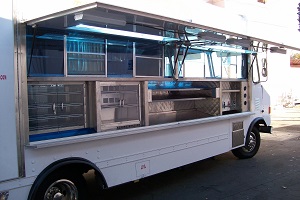
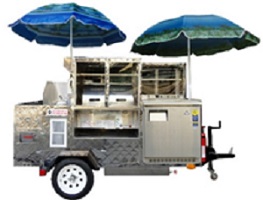
Examples of Moderate-Risk Mobile Food Facility

Example of Low-Risk Mobile Food Facility
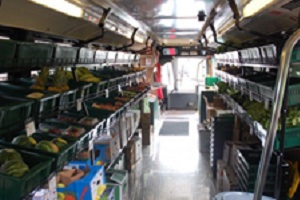
The level of risk, high or low, has to do with the menu items that will be available. For example, pre-packaged food that does not need to be refrigerated is generally considered low risk. Soft serve ice cream and other foods that will need to be refrigerated and prepared are considered high risk because of the potential for food-borne illness.
Mobile food facilities include:
- Food Service Trucks, Trailers, and Boats
- Soft Serve Vehicles
- Prepackaged Ice Cream Vehicles
- Produce Vehicles
- Retail Fish Vehicles
- Retail Bakery Vehicles
- Limited Food Preparation Vehicles
- Mobile Support Units
Report a Problem
To report a problem with a food truck or cart, call Public Health's Mobile Food Program at (626) 430-5500 or send email to ehvip@ph.lacounty.gov. It is helpful to report details about the problem, such as exact location of the food sales, day and times of operation, and a description of what the vendor is doing.




